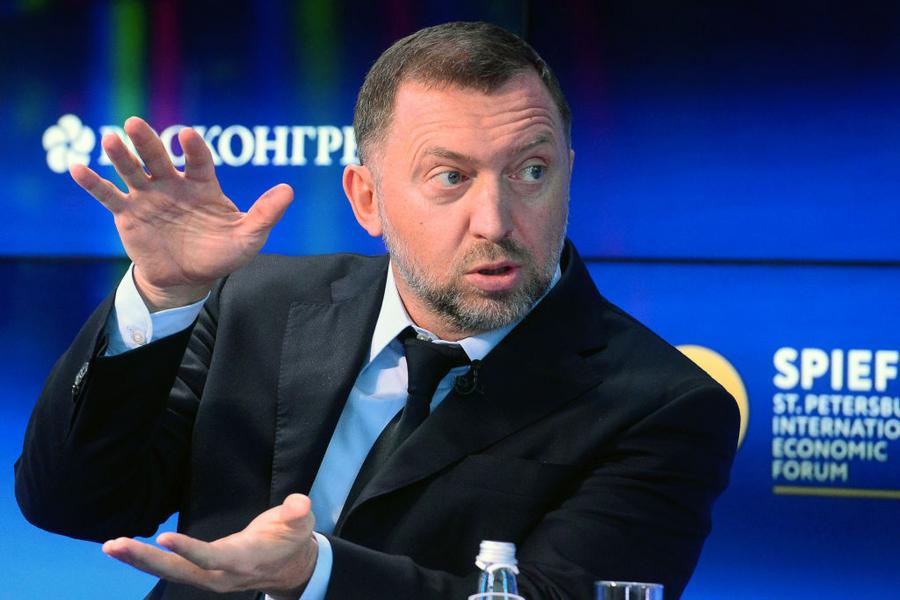Oleg Deripaska threw a lavish party at Davos in January with champagne and performances by Enrique Iglesias and Russian folk dancers. Now, just a few months later, the Russian oligarch is on an international blacklist that is usually reserved for terrorists, warlords, and human rights violators.
Last week, the U.S. leveled its most severe sanctions at Deripaska's metals conglomerate. Americans are banned from dealing with companies including United Co. Rusal. This move caused Deripaska's empire, the largest aluminum producer outside of China, to lose half its value in one day.
The sanctions bar Deripaska from participating in the economy of the global dollar. The impact of this was instant. International investors dumped stocks and bonds issues by Deripaska's companies and aluminum traders refused to by metal from Rusal.

OLGA MALTSEVA/AFP/Getty Images
Oleg Deripaska was born in Soviet Russia in 1968. He grew up on his family's farm, where he learned to live off the land from his grandparents. His mother was a widow and an engineer and she left the farm to find a job. Deripaska loves to read and his metals empire headquarters feature walls of books. He was a good math student and enrolled at Moscow State University. One year into his studies he was drafted into the Soviet army and spent three years in Siberia. When he returned he went back to school and graduated with honors from Moscow State University in 1993. He wanted to become a theoretical physicist, but the collapse of the Soviet Union caused financial aid to dry up. He received his master's degree in economics in 1996 from Plekhanov University of Economics.
When he was 25, he teamed up with engineers, rocket scientists, and other physicists to form his first metals trading company, VTK. VTK bought metals at low Russian prices and sold it abroad for significantly more. He used his profits to acquire shares in Sayanogorsk Aluminum. Between 1993 and 1994, Deripaska became the largest individual shareholder in the company behind Russia itself. That annoyed the company's Communist-era bosses.
Deripaska became the director general of the Sayanogorsk Aluminum plan in 1994 at age 26. In 1997, Sayanogorsk became the core asset of Sibirsky Aluminum. Deripaska was president of Sibirsky, which became the core asset of Rusal. Oleg Deripaska has a net worth of $7.5 billion.
Oleg Deripaska led the consolidation of Russia's aluminum industry. He has always been the face of Russian metals across the globe. He spent decades cultivating the U.S. and other Western business circles and the sanctions immediately wiped all that out. He may be able to continue to do business in Russia, but he has been crippled elsewhere in the world by the sanctions.
The strength of the impact of the Russian sanctions reverberated throughout Russia's financial markets. Businesses controlled by the 27 individuals sanctioned by the U.S. are ripe for attack. Stocks in Moscow fell by the most in four years and the ruble had the biggest drop in value in the world. Investors sold stock with ties to major Russian oligarchs.
Deripaska's Rusal now has the challenge of running an aluminum empire with customers like Toyota while being unable to do business in the Western financial system.
Deripaska faces some particular issues as one of the most controversial billionaire oligarchs with close ties to Vladimir Putin. His years climbing the ladder of the metals industry are filled with allegations that he ordered the murder of a businessman, bribed a government official, and has links to the Russian mafia.
Deripaska officially called the sanctions against him "groundless, ridiculous and absurd." Remember, he is the Russian that had ties to Donald Trump's former campaign manager Paul Manafort.
The day the sanctions were announced, Deripaska was celebrating Rusal's 18thbirthday.
The next day shares of Rusal collapsed. They fell 50% on the Hong Kong stock exchange.
/2013/12/oleg.jpg)
/2018/10/GettyImages-691072630.jpg)
/2018/08/GettyImages-457060836.jpg)
/2018/04/GettyImages-450539313.jpg)
/2018/02/GettyImages-691072630.jpg)
/2022/03/GettyImages-108496830.jpg)
/2023/10/elaine-wynn.jpg)
/2013/06/Wink-Martindale-1.jpg)
/2020/10/cate.jpg)
:strip_exif()/2020/06/taylor.png)
/2021/04/William-Levy-1.jpg)
/2021/10/John-Boyega.jpg)
/2010/11/Sara-Bareilles.jpg)
/2010/03/nc.jpg)
/2021/12/peter.jpg)
/2020/03/steve-wynn.jpg)
/2014/05/Daisy-Ridley.jpg)
/2013/01/Al-Jarreau.jpg)
/2018/04/GettyImages-942450576.jpg)
/2019/02/jalex.jpg)
/2010/11/russell-armstrong.png)
/2010/10/ts.png)
/2022/01/audra.jpg)